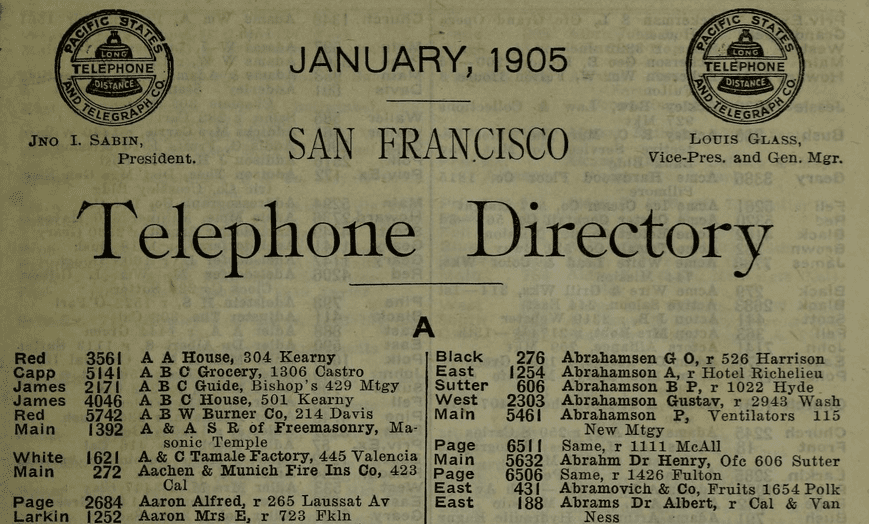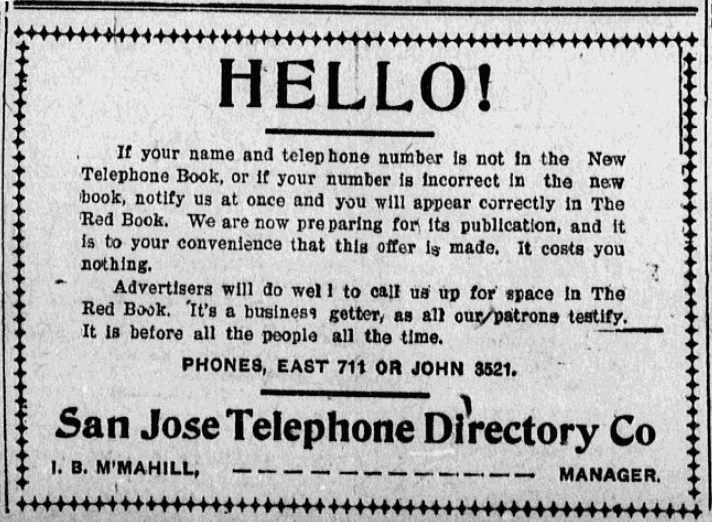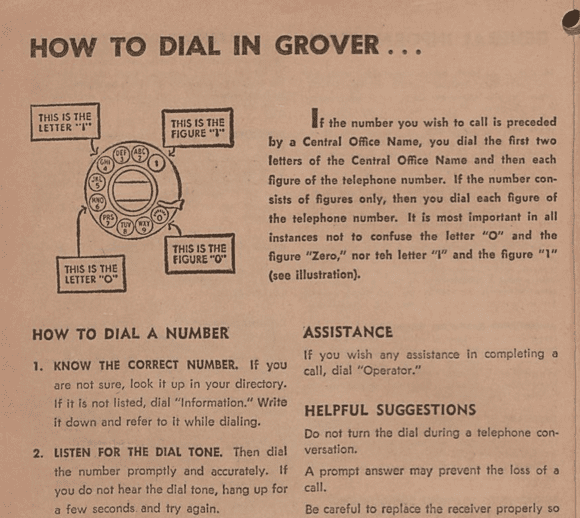Introduction: In this article – part of an ongoing “Introduction to Genealogy” series – Gena Philibert-Ortega explains how telephone books can be a great help to your family history research, and provides links to where you can find old telephone directories online. Gena is a genealogist and author of the book “From the Family Kitchen.”
Have you thought about using a telephone book for your genealogy? You might be thinking, “the telephone book is too recent, that won’t help me with my family history!” While we tend to think of city directories for family history research, and we should, the telephone book has been around longer than most people realize – and in some cases, it’s the perfect complement to city directories.

The Beginning
Although not the only one to come up with the idea, Alexander Graham Bell is credited with inventing the telephone. He made the first phone call on 10 March 1876, in which he famously called his assistant and asked, “Mr. Watson, come here – I want to see you.” (1)
Since then, the telephone has been an important means of communication that has evolved over time and today is used in ways that Bell never could have imagined. Within a few years of that historic first telephone communication, a need for a listing of telephone subscribers arose – but that first telephone directory, in 1878, surprisingly contained no numbers for the 50 people it listed in New Haven, Connecticut. Connecticut telephone books would not include telephone numbers until 1889!
These early telephone books weren’t meant to share telephone numbers; instead, they were meant to provide the names of subscribers. (2) While not everyone had this new technology, by 1880 there were 30,000 telephone subscribers in the United States (the population of the U.S. was over 50 million at this time). (3,4)
Even by 1884 rural states like Nebraska had a telephone book with a list of subscribers and stations (places with public telephones).

City directories are important to genealogical research – but searching for telephone books, depending on the time period, can be equally important. Telephone and city directories were published at the same time until at least the mid-20th century. Why the overlap? Directories that listed nearly everyone in a town were still important as telephones weren’t in wide use that early in its history. Telephone books in combination with city directories provide information about ancestors in the 10-year gap between federal census enumerations.

What Telephone Books Tell Us
Name, telephone number, and street address is the standard information found in a telephone book, similar to a city directory. It’s important to remember that the head of the household may be the only one listed in the telephone book. Browse by surname to ensure that you have not potentially missed a name due to variations (like using initials instead of a first name). Telephone books are also a good way to learn more about the community your ancestor lived in, such as listings for cemeteries, membership organizations, churches and schools. Early telephone books are also a great source for telephone social history. They provide tutorials on usage like proper phone etiquette, how to answer the phone, and how to dial.

Finding a Phone Book
One of the best places to find a phone book is to look at digitized book websites such as Google Books, Internet Archive, and digitized collections such as Digital Public Library of America, as well as digital collections available from other archives and libraries.
Library digital collections may have digitized copies of historical telephone books for their areas, including the New York Public Library Digital Collection, Brooklyn Public Library, and the Denver Public Library, just to name a few. The website Old Telephone Books has some links to telephone books and other information about historical telephone books that might also be useful.
__________________
(1) “The First Telephone Call,” America’s Library (http://www.americaslibrary.gov/jb/recon/jb_recon_telephone_1.html: accessed 21 August 2018).
(2) Shea, Ammon. The Phone Book: The Curious History of the Book That Everyone Uses but No One Reads. New York: Perigee Book, 2010.
(3) Ibid.
(4) “1880 United States Census,” Wikipedia (https://en.wikipedia.org/wiki/1880_United_States_Census: accessed 21 August 2018).

Previously I’ve found phone books just in public libraries. I plan to check out some of your sources.
Are there any Canadian phone books, say for Toronto, Winnipeg, Regina, etc., available?
Claire,
There’s a few websites you may want to take a look at including this one called Old Telephone Books, http://www.oldtelephonebooks.com/country/Canada. It does include Manitoba.
The Toronto Public Library website has links to city directories into the 1960s. Now I know you asked about phone books but the city directories have the same information minus the phone number. These are all digitized and available on Internet Archive.
Make sure to look through the public library websites for other cities you are interested in. Also check digitized books websites like Google Books.
Good luck with your research!
Muckleroy,
You can definitely still find them there as well. But it’s so much nicer to have them available online . Good luck with your research and thank you for taking the time to comment.–Gena
FYI, some city directories included people who had died and/or moved in a special section for the past year. Don’t overlook this valuable information; it may be the only place you will find a death notice.
Absolutely! And in some cases the mention of a death or of a woman being a widow might happen even more than a year later.
Thanks for posting that important reminder Sandra.
Hello from Ohio. Do you know the cut-off for the information gathered for the next year’s telephone directory? So, for instance, if someone died or divorced or moved at the end of the year, the information in the directory would be wrong already. The cut-off could be as early as 6 months prior to January when the new directory would come out. I know many directories have a 2 year span, i.e., 1970-1971, so a 6 month cut-off would be reasonable. I have tried to look into this question with no results. I appreciate your consideration.